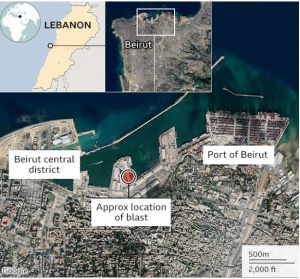A powerful explosion has hit the Lebanese capital, Beirut, causing widespread damage and injuring many people, officials say.
It is not yet clear what caused the explosion in the city’s port area. The online video showed a large cloud of mushrooms and destroyed buildings.

Hospitals are considered overwhelmed by the victims.
A delicate moment comes with the country’s economic collapse, which repeats the old tensions.
Tensions are far ahead of the 2005 trial for the assassination of former Prime Minister Rafik Hariri. A United Nations court is expected to deliver its verdict at a hearing against four suspects in the Hariri car bomb murder on Friday.
Follow our updates in real time
Lebanese Health Minister Hamad Hassan spoke of the many injuries and major damage.
The Reuters news agency cites sources that 10 corpses were pulled from the wreck.
The cause of the explosion is not yet known, but some reports suggest it may have been an accident. The Lebanese National News Agency reported a fire that broke out in a so-called explosive depot port.
Image copyrightREUTERS
Local media have shown that people are trapped under the rubble. A witness described the first explosion as deafening. The footage showed destroyed cars and destroyed buildings.
The latest reports come from political tensions in Lebanon, street demonstrations against the government managing the worst economic crisis since the 1975-1990 civil war.
Tensions were also on the border with Israel, which said last week that it had thwarted Hezbollah’s attempt to infiltrate Israeli territory.
I saw the fire, but I still didn’t know there was going to be an explosion. We went in. Suddenly I lost my hearing because I was obviously too close. I lost my hearing for a few seconds, I knew something was wrong.
And then suddenly the glass shattered all over the car, the machines around us, the shops, the shops, the buildings. Only glass that descends from the whole building.
Literally all over Beirut, people were calling each other from miles from different areas and experiencing the same thing: broken glass, shaking buildings, a loud explosion.
In fact, we were shocked, because usually when that happens, only one area will experience these events after the explosion, but this time it was all of Beirut, even areas outside Beirut.
Shock and anxiety
By Sebastian Ushers, BBC Arab Affairs Analyst
Videos and images not only of the huge cloud of smoke exploding in Beirut, but also of the devastation and devastation it has done for miles, have sparked a new wave of shock and unrest in Lebanon, which is already staggering on the verge of threatening. catastrophic economic collapse.
A few hours before the explosion, anti-government protesters had torn themselves with security forces outside the energy ministry, once again calling for the leaders to take responsibility.
There are strong warnings on the streets of a resurgence of famine or conflict in the sectarian sector if the economy deteriorates.
And the explosion will remind many of the bomb in which Rafik Hariri was killed. The Lebanese hope that this latest explosion will remain a human tragedy – an accident – rather than a deliberate action.
What is the Hariri case about?
On the morning of 14 February 2005, Rafik Hariri, the then Member of Parliament who joined the parliamentary opposition, marched when an explosion exploded into a crowded area full of hotels and banks, causing extensive damage.
Hariri was one of Lebanon’s most prominent Sunni politicians and, at the time of his death, had joined Syria’s requests to withdraw troops that had been in Lebanon since the 1976 civil war.
The assassination took tens of thousands of protesters to the streets to protest against the Syrian proclamation government, killing with a finger of guilt the assassination of Lebanon’s very influential neighbor.
Within two weeks, the government resigned, and a few weeks later, Syria withdrew.
Following the gathering of evidence, the United Nations and Lebanon set up a special Lebanese tribunal (STL) in The Hague in 2007 to investigate the bombing, and eventually indicted four suspects in the Iranian-backed Hezbollah-backed terrorist group and assassinations. and attempted murder.
In 2016, the fifth man involved in the attack, Hezbollah’s military commander Mustafa Amine Badreddine, was killed in Syria.
Leave a Reply